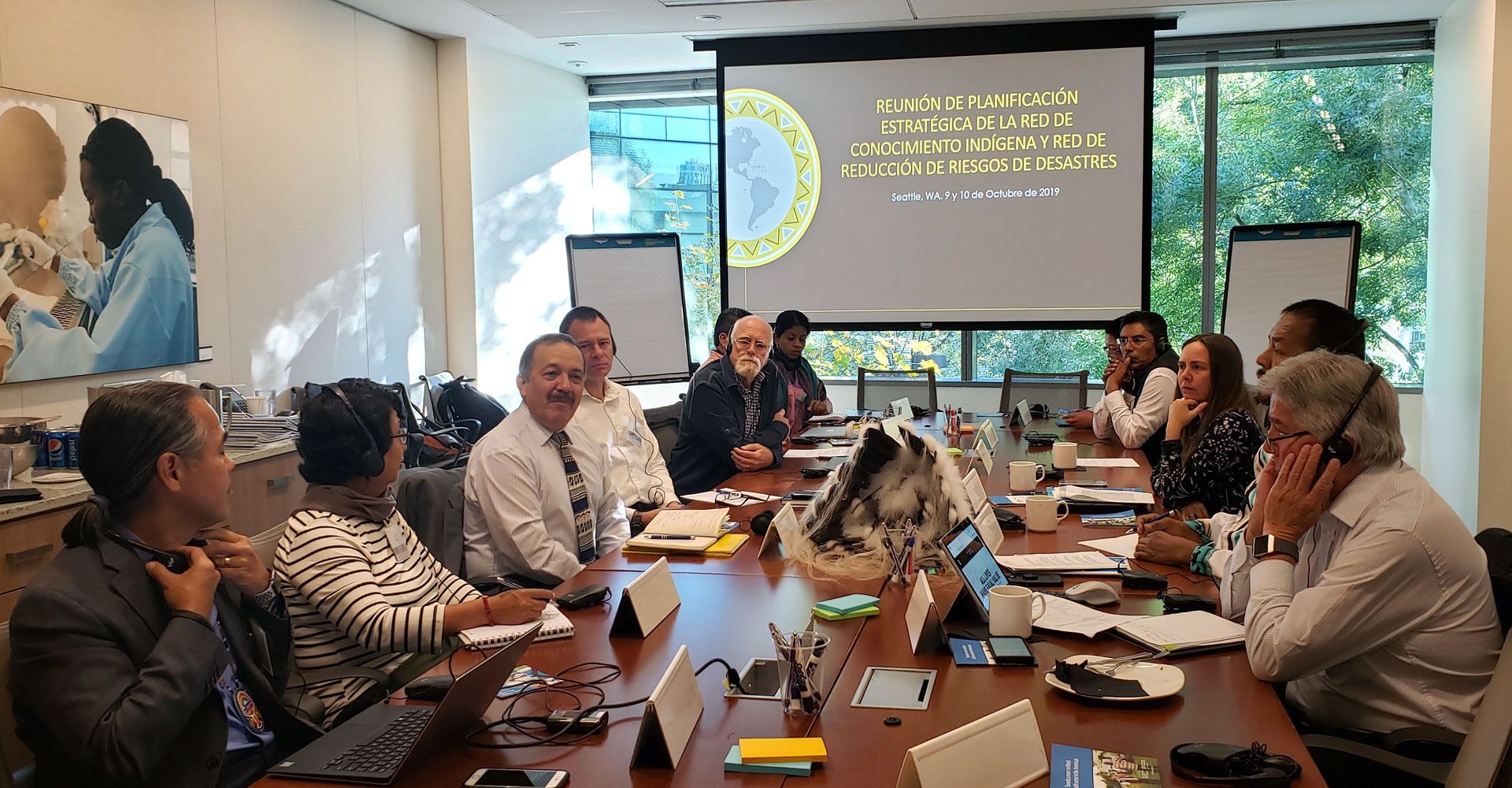
...a partnership between Indigenous communities and experts in health and disaster risk reduction
Background
The Indigenous Knowledge and Disaster Risk Reduction Network collaborates with Indigenous peoples and disaster risk management professionals to promote coordination and engagement. The network focuses on collecting, producing, maintaining and sharing information to advance disaster risk reduction with an emphasis on health and resilience in Indigenous communities in the Americas and Caribbean. The network works to catalyze knowledge exchange and empower Indigenous peoples and disaster risk management professionals through documentation of knowledge and strategies that contribute to disaster risk reduction.
For the past several years, the concept of establishing a network to bring together disaster risk reduction experts and indigenous communities has been central in discussions. In 2014, representatives from ten countries in the Region of the Americas met in Vancouver, Canada, for the PAHO-sponsored Hemispheric Consultation on Indigenous Peoples and Disaster Risk Reduction, where Indigenous delegates discussed experiences and strategies from their cultural perspective. Participants of the consultation called for establishing a mechanism for knowledge-sharing to advance health disaster risk reduction and resilience in Indigenous communities, both by catalyzing dissemination of Indigenous knowledge and improving access to information on the impact of manmade disasters on Indigenous communities.
Several events that followed the 2014 Hemispheric Consultation continued to prioritize highlighting the disproportionate effect of disasters on Indigenous communities, and the necessity to incorporate and value Indigenous knowledge as an essential component of disaster risk management programs and policies. In 2018, the ISDR hosted the 6th Regional Platform for Disaster Risk Reduction in the Americas in Cartagena, Colombia. The CARTAGENA Declaration was developed as a result of this platform and recognized the need to apply an equitable, inclusive approach to disaster risk reduction. In 2018, PAHO sponsored an Indigenous Consultation in Mexico, where regional Indigenous leaders and health officials from Canada, Ecuador, the United States, Guatemala, Honduras, Mexico and Peru could gather and share knowledge, recognize potential areas for development and identify priority needs in different populations. Several groups at the consultation were encouraged to study mechanisms to develop tools with the purpose of integrating Indigenous knowledge and disaster risk management. The working group agreed that integrating Indigenous Knowledge and disaster risk reduction for health would require establishing a regional network. This action was fulfilled when the Indigenous Knowledge and Disaster Risk Reduction Network was founded after the consultation in Mexico.
Prior to the development of this network, there was no clear process for implementing the integration of disaster risk reduction knowledge with Indigenous knowledge to promote disaster risk reduction in Indigenous communities. Networks exist that encompass health and disaster risk reduction, and networking efforts have been made with a focus on Indigenous health. However, prior to the development of this network, no space or body of knowledge existed that brought these areas of interest together with a goal of connecting individuals and sharing knowledge. Our aim was to establish a network to exchange information, improve collaboration, and heighten communication between Indigenous communities regarding disaster risk reduction strategies with a focus on health.
Access to and sharing of knowledge is key to understanding and developing inclusive disaster risk reduction plans. However, those interested in learning more about Indigenous disaster risk reduction experiences may face difficulties finding resources, as many documented experiences often aren’t published and are therefore buried into ‘gray literature.’ To ease access to these essential materials, the Indigenous Knowledge and Disaster Risk Reduction Network committed to developing and maintaining a web-based resource center to promote information sharing, communication and collaboration.
Today, the network spans Latin America, the Caribbean and North America, gathering and sharing Indigenous knowledge and disaster risk reduction strategies from across the region. The region of the Americas is characterized as multiethnic and multicultural; however, different Indigenous groups, communities, villages, and nationalities face systemic discrimination and continue to be overrepresented in the most vulnerable parts of society. The Region of the Americas is also particularly susceptible to disasters, second only to Asia. Climate change poses an immediate and long-term hazard for all communities of the world and is likely to hit the poorest communities hardest, including Indigenous peoples. Deforestation and fragmentation of the Amazon forests, the melting of the ice in the Arctic, rising sea level and acidification of the oceans puts indigenous groups in danger when extreme weather conditions occur. With the support of the network, communities will have the opportunity to develop and tailor approaches and strategies that are specific to their needs based on disaster risk reduction knowledge and indigenous knowledge and experiences.
